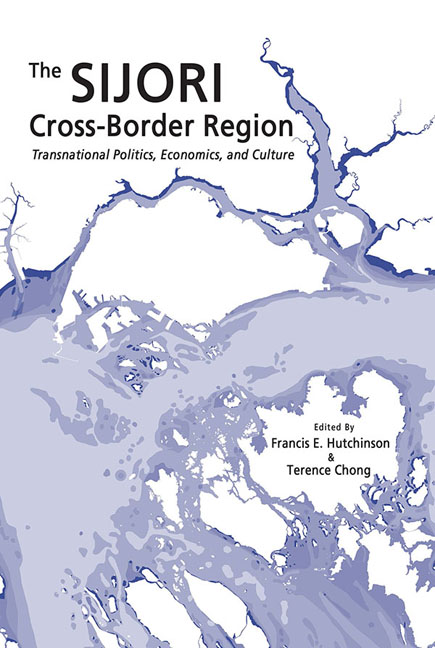Book contents
- Frontmatter
- Contents
- List of Maps
- List of Tables
- List of Figures
- Foreword
- Acknowledgements
- Contributors
- Abbreviations
- Introduction
- Section I Understanding the Whole
- Section II Policy and Politics
- Section III Cross-Border Social and Cultural Communities
- Map4
- 9 The Significance of Riau in SIJORI
- 10 Singaporeans Living in Johor and Batam: Next-Door Transnationalism Living and Border Anxiety
- 11 Singapore Malay Family Businesses: Negotiating Malaysian and Singapore Citizenship and National Identities
- 12 Imaginary Frontiers and Deferred Masculinity: Singapore Working-Class Men in Batam
- Section IV Formal and Informal Economies
- Conclusion
- Appendix
- Sources for the SIJORI Maps
- Index
10 - Singaporeans Living in Johor and Batam: Next-Door Transnationalism Living and Border Anxiety
from Section III - Cross-Border Social and Cultural Communities
Published online by Cambridge University Press: 22 July 2017
- Frontmatter
- Contents
- List of Maps
- List of Tables
- List of Figures
- Foreword
- Acknowledgements
- Contributors
- Abbreviations
- Introduction
- Section I Understanding the Whole
- Section II Policy and Politics
- Section III Cross-Border Social and Cultural Communities
- Map4
- 9 The Significance of Riau in SIJORI
- 10 Singaporeans Living in Johor and Batam: Next-Door Transnationalism Living and Border Anxiety
- 11 Singapore Malay Family Businesses: Negotiating Malaysian and Singapore Citizenship and National Identities
- 12 Imaginary Frontiers and Deferred Masculinity: Singapore Working-Class Men in Batam
- Section IV Formal and Informal Economies
- Conclusion
- Appendix
- Sources for the SIJORI Maps
- Index
Summary
INTRODUCTION
Trends in the movement of Singaporeans to Johor and Batam reflect the city-state's financial leverage over Malaysia and Indonesia within an economic configuration known as the Singapore-Johor-Riau (SIJORI) Growth Triangle or Cross-Border Region. A SIJORI Growth Triangle was first proposed in 1989 by Singapore's Economic Development Board and later reconceptualized as the Indonesia-Malaysia-Singapore Economic Growth Triangle (IMS-GT) in 1994. This arrangement was conceived by a “vision of economic complementarity” which aimed to achieve mutual growth among these geographically proximate territorial units where Singapore would supply capital, and Johor and Riau would supply low-cost land and labour (Bunnell et al. 2012, p. 466).
Within Riau, Batam Island has received substantial foreign investment since the 1990s, the bulk of which comes from Singapore; this includes joint-ownership of industrial estates such as the Batamindo Industrial Park (Bunnell et al. 2012, p. 469, citing Azis 2010; Grundy-Warr, Peachey and Perry 1999, p. 310). The flow of Singaporean capital to Batam has naturally been accompanied by the movement of Singaporeans onto the island to oversee company operations. Most work for Singaporean companies seeking to capitalize on cheaper access to land and labour.
On the Malaysian end, robust cooperation between Singapore and Johor was initially encumbered by historical tensions between both countries, but by early 2007, the Malaysian government had officially launched Iskandar Malaysia, which is seen as a “strategic zone for bilateral cooperation” between Singapore and Malaysia (Ormond 2014, p. 13). The aim of Iskandar is twofold: to compete with Singapore to attract industrial development and foreign direct investments; and to cooperate with Singapore to accommodate the city-state's desire for space and lower labour costs; while providing Johor Bahru with capital and know-how. Between 2006 and January 2014, Singapore was the largest foreign investor in Iskandar, investing approximately S$4.2 billion (Kotwani 2014).
In addition, property realtors in Iskandar have been targeting Singaporeans, wooing them with bigger homes at significantly lower prices compared to Singapore and within close proximity to international schools and the island-state (Ong 2011; Ahmad 2011). It is estimated that the number of commuters between Johor and Singapore will double when Iskandar Malaysia is complete (Rizzo and Khan 2013, p. 154) and current data indicates that up to 17 million trips were made by Singaporeans into Johor in 2013 (Kotwani 2014).
- Type
- Chapter
- Information
- The SIJORI Cross-Border RegionTransnational Politics, Economics, and Culture, pp. 267 - 292Publisher: ISEAS–Yusof Ishak InstitutePrint publication year: 2016



